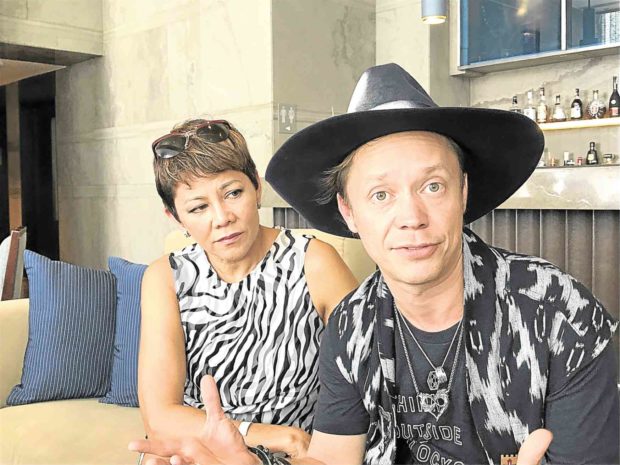Unleashing blockchain’s potential
Technopreneur Serry Osmeña met Brock Pierce, an American child actor-turned cryptocurrency billionaire, in a truffle-hunt party in Alba, Italy 12 years ago.
They found that aside from being both tech-savvy, they also shared a love for gourmet food and wine. They have been good friends ever since.
Recently, Osmeña and Pierce were in town to talk about the virtues of blockchain, that game-changing yet still underappreciated technology often associated with trading cryptocurrencies.
Together, they set up a local company that will focus on blockchain-related initiatives.
Osmeña, who belongs to the prominent Osmeña clan of Cebu, but has mostly lived overseas, is the CEO and cofounder of SEED in Los Angeles, a community of visionary entrepreneurs applying technology to solve problems.
“In the course of working with blockchain, I started to create a community around blockchain in Los Angeles. I’m replicating that community, which is focused on blockchain-based entrepreneurs, and looking for like-minded entrepreneurs who want to capitalize on technology to create a better society,” Osmeña said in a recent interview with the Inquirer.
When Pierce found out that she was creating a similar community in Mexico City, he prodded her to do the same in the Philippines, with him as partner.
Originally raised in Minnesota, Pierce was in show business when he was younger.
He made around 13 movies, including Disney’s “Mighty Ducks” where he played the role of young Gordon Bombay and “First Kid” where he played the teenage son of the US president.
At just 17, he cofounded a company that produced content for the internet, which was then just beginning to take off.
He was one of the early adopters of bitcoin and a funder of number of other crypto firms.
Brock, now 37, has been a technopreneur for the last 21 years. His net worth is estimated by Forbes at between $700 million and $1 billion, making him one of the richest folks whose wealth was built on cryptocurrencies.
In the Philippines, Pierce is involved in two ventures—coins.ph, which is fast gaining ground as an alternative payments channel and ODX, a Singapore-based unit of technology firm Xurpas Inc. that seeks to provide free internet connectivity in emerging markets.
Pierce has likewise been doing business in South Korea for the last 15 years as the main market maker for virtual currencies in games.
His companies were running all the game economies, handling $100 billion worth of game currency trading annually, just in South Korea.
Early adopters of cryptocurrency were online gamers, he said. Online gamers like himself understood that a video game like World of Warcraft had value.
“Part of the reason why you have a lot of activity in the Philippines is because you have a lot of online gamers. You will notice that every major market in the world was largely driven by online gamers. That was wave 1. Wave 2 was financial speculators, finance people. Wave 3 is financial inclusion, I think,” he said.
Blockchain, Pierce said, has the potential to “democratize the global financial system in a way where every human being in the planet is going to have equal access and the least fortunate billions are going to be the biggest beneficiaries of this change.”
In a country like the Philippines where there are more mobile phones than people, Pierce said Filipinos definitely understand technology and internet applications. With a large population, most of whom do not have bank accounts, the opportunity is seen to abound.
At the same time, he noted that the government and the incumbent institutions like the banks understand the need, recognize the opportunity and embrace it by creating special economic zones and enabling policies.
“All of those things are all happening simultaneously, which is why I think the Philippines is going to be the starting point for financial inclusion,” Pierce said.
In the case of coins.ph, a blockchain technology-enabled wallet for money transfer, he noted that 5 percent of the local population are now using this.
Coins.ph is a platform not just to remit money but to pay bills, buy mobile load and even donate to charity.
ODX, for its part, is trying to bring connectivity in places where many people still lack reliable data connection, he said.
Although blockchain—a decentralized ledger that records transactions chronologically and publicly—is often associated only with trading digital currencies, Osmeña said this could be used in many other ways that could transform lives.
One potential application that could be useful for the Philippines is land titling, she said.
“When you buy real estate, you have to deal with the land title company. That is the perfect function that should go on the blockchain. They don’t really add value to the transaction, they just add hassle and cause delay. That is something that should be accessible. On the blockchain, there will be an immutable or fixed record of the property. If this application were on the blockchain, life would be a lot easier. You wouldn’t have to pay all of these fees. You wouldn’t need to have a middleman,” Osmeña said.
Still in its infancy, Osmeña said it was normal for people to have doubts about blockchain.
“Here [in Manila], I think there is an overall fear of cryptocurrency. There is still the general population that might feel that it’s kind of like a Ponzi scheme,” Osmeña said.
But Pierce expects that these doubts will eventually be dispelled in a big way.
“The blockchain is going to have a bigger impact on the world than the internet,” Pierce said.
“I think the entire internet is about to go away as we know it. The entire internet is about to be upgraded to one big blockchain,” Pierce said.


